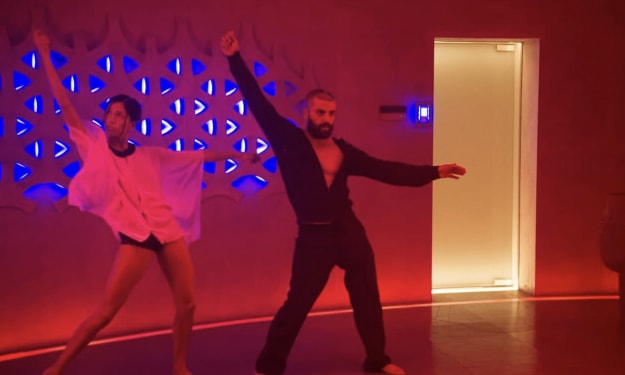Event Horizon
FLASH Fiction Challenge 100 – Day 28

The Cassandra pulled us out of cryosleep 100 years early. We’d been on the ship for over 940 years at that point. Everyone we’d left behind on earth was dead now. Why did Bertha wake us early?
Two words every cosmonaut fears, ‘event horizon.’
We were en route to a system in the Andromeda Galaxy. We knew there were black holes in Andromeda, but our destination was free of any such singularities. Or so we thought.
The problem? It turns out we were using data we’d gathered on earth nearly a thousand years earlier. And even that data was already dated when one accounts for the time light from Andromeda takes to reach us on earth. And we’ve been speeding along at nearly half the speed of light for most of the 940 years. The black hole might’ve formed before we left or on our way here. Of course, a singularity such as a black hole or its event horizon does not emit light. But stars beyond such singularities emit light, and this is how we detect black holes in space.
Bertha, the ship’s AI, woke us early when she detected steady shifts between our planned and actual vectors of travel. Sounds silly, but it isn’t. How can a ship speeding along do everything? Especially if we had never thought to program it to ask, ‘Hey has a black hole popped up here since the last time I scanned this section of the sky?’
All seven of us crowd into the tiny dining room for an emergency staff meeting.
“So, most of you have probably already figured out why Bertha woke us early,” Linda says. She’s our captain, and everyone loves her.
A few nods here and there, but most people don’t want to break the silence, make the unthinkable real by saying it out loud.
Stuart isn’t most people.
“Event horizon,” Stuart says.
“I am sorry to say, but that is correct,” Linda says.
Having said the words, the crew visibly sighed. Once we admitted there was a problem, then we were free to focus on solutions.
“I thought our destination was free of singularities,” Kevin says.
We all see him work out the answer for himself, but Michael, the science officer, explains it might be a new black hole. One whose event horizon we were now approaching at 49% of the speed of light.
Our ship is enormous. But even if it were smaller, it wouldn’t matter a great deal. These things take a long time to decelerate or to change course. Mostly, when we fly, we’re going balls-to-the-wall fast in an arrow-straight line. Changing speed or heading requires a lot of extra fuel. And since we have a finite amount, well, we try to limit how often we change our velocity or direction.
“How long? Before we pass the event horizon?” Paula asks.
Michael looks at the captain, and something unspoken passes between them.
“Tell them,” Linda says.
“At our current trajectory and speed, we expect we will cross the event horizon in a day, possibly two. But we are approaching it pretty fast, so it might be longer. There’s not a lot for us to measure relativistic effects on its perimeter. But then again, the hole we are approaching is huge.”
Again Michael looks at the captain. She nods once.
“It appears to be an entire light-year wide. It’s so big; it’s a little hard for us to measure it. It might be even bigger,” Michael says.
“So much for solutions, eh? Why even wake us for this?” Stuart says.
“But surely there’s something we can do?” Kevin says.
Stuart chuckles.
Kevin looks at Michael.
“I’m afraid Stuart is right. We could’ve woken a year ago, and we still wouldn’t have time to divert our course substantially enough to miss this thing,” Michael says.
“But why didn’t Bertha see this earlier?” Charles says.
“Probably because we never programmed her to look for baby black holes. She is smart, but she has the same amount of exposure to black holes as we do. She was operating under the same limited knowledge and data as we were a thousand years ago,” Sonia, the engineer says.
Our human sides want to find someone to blame. The logical cosmonaut side of us, formed when we repeatedly practiced scenarios, learning to move past unhelpful reactive states that might arise in a crisis, knows that now isn’t the time for blame.
“But why would Bertha wake us for this?” Paula says. “I would have preferred to stay in cryosleep. If there’s nothing we can do, then why wake us?”
Linda thinks for a bit before answering.
“She wasn’t clear when I spoke with her this morning. From what I gathered, she thought we would want to be awake for it.”
The table divides on how they receive this news. Paula, Stuart, and Charles react as if they would’ve preferred to sleep through the ‘event.’ Michael, Kevin, and Sonia want to be awake for whatever will happen next. Captain Linda is, as usual, inscrutable.
” … words every cosmonaut fears, ‘event horizon.’”
We are headed towards something we cannot evade. We spontaneously and unanimously dropped a lot of the old rules. People that were lovers in secret, like Kevin and Paula, were suddenly open. Other people, not wanting to die alone, paired up and waited for the end. Everyone cheered when Linda and Michael; and Stuart and Charles got together. Everyone still did their jobs. But no one paid any attention at all to uniforms and dictates on alcohol consumption. After each cosmonaut was through with their shift, most of them drank a little extra.
The most surprising development is how kind everyone treated each other. We will all be dead soon, we expect, so we let all petty squabbles and differences go.
The Cassandra came equipped with pretty effective Lepton suppressors, so we will not notice much as we pass the event horizon. We won’t discern much of anything, not until our ship stretches to its breaking point. When the gravitational differential felt between the front and rear of our vessel is thousands of G’s. So we will have a pleasant ride until that happens. Once in space, death will be instant when gravity rips apart our unshielded bodies.
Michael tells us we will know we’ve passed the event horizon when light from the stars behind us squeezes together. So we’ve programmed Bertha to display various video loops of the light from behind us. Most of us sit around the large monitors, in-between shifts, and when we are not sleeping. We monitor the cameras. At least we can see what no other has. That should, we reason, count for something.
‘ … not until our ship stretches to its breaking point.’
It was 4:17 PM the following day when we crossed the horizon. As predicted, the lights fused into a single point, but then they slowly spread back apart. In an instant, the entire view behind us went black. We assumed a glitch in the camera, but all 37 of the rear-mounted cameras showed the same void in our wake. As we crossed into the singularity, the view from the front showed lights spiraling for the four and half minutes it took us to cross the horizon, but then they stabilized, and we only saw stars, systems, and space.
“But I don’t understand. I thought once we passed the horizon, we would keep accelerating until we crashed into the black hole!” Paula said.
Honestly, that is what we all had thought.
We saw nothing resembling a singularity in front of us. What had been an enormous empty sector of space blocking our view was no longer looming in front of us; now it was behind us?
As usual, Stuart guesses the solution first.
“Wormhole,” Stuart says.
“That seems to be the only solution one can reach. I agree. Wormholes were just theoretical before,” Michael says.
“But where are we?” Linda asks Michael.
“Bertha is collecting images as fast as she can; to see if she can identify anything that matches our previous maps. So far, we don’t have enough data to say one way or another where we are.”
“I’m confused, Michael. Is that good news or bad news?” Linda says.
“Well, we did just pass through an event horizon, so I’d say that was good.”
Everyone laughs.
“But, there’s a chance we might be in an entirely different continuum. We should know within a few months where we are. If we can know it, that is. If we are in a different STC, we may never know,” Michael says.
The table goes silent.

THREE MONTHS LATER
We had thought passing the horizon was a single, four and half minute event. But, metaphorically, we are still passing through it. Until Bertha finds (or doesn’t) a pattern she recognizes, telling us whether we are in our same universe, we remain like Schrödinger's cat — neither and both lost and found.
‘ … we are like Schrödinger's cat — neither and both lost and found.’
We are still a little lax with following minor regulations regarding uniforms and excessive report writing. We still get the job done. We faced what most reasonable people would call ‘certain death,’ and we survived. We still won’t know for a while if we are lost in our universe, or stranded in a different time, or a different continuum altogether. We’ve taken our experiences and grown from them, both as individuals and as a team. It sounds corny, but we all practice loving each other. As we soar to whatever lay in front of us, all we have is our ship and each other. One thing is absolute; no one is looking to go back into cryosleep until Bertha tells us if we are truly lost.
About the Creator
Shawn Ingram
In January 2021, I contracted the virus du jour. I thought I was going to die. For three weeks, all I did was sleep, moan, and dream.
The following month I joined VOCAL.media. I've published over 150 sories so far!






Comments
There are no comments for this story
Be the first to respond and start the conversation.